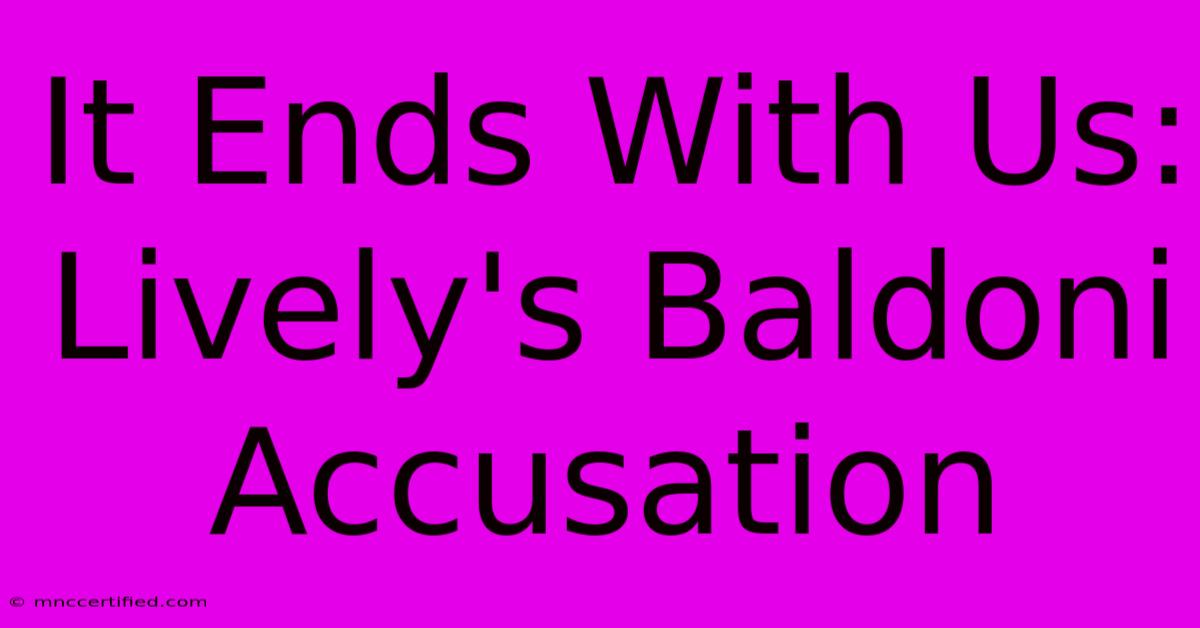It Ends With Us: Lively's Baldoni Accusation

Table of Contents
It Ends With Us: Colleen Hoover's Book and the Baldoni Accusation – A Deeper Dive
Colleen Hoover's It Ends With Us has captivated millions, sparking fervent discussions about love, trauma, and abuse. However, the novel's popularity has been intertwined with controversy following accusations against Hoover's friend and editor, Heidi Vander Zee Baldoni. This article will delve into the details of the accusations, their impact on the book and its author, and the broader conversation they've ignited.
The Accusations Against Heidi Vander Zee Baldoni
The accusations against Heidi Vander Zee Baldoni, Colleen Hoover's longtime friend and editor at Atria Books, surfaced online, primarily through social media. These allegations, which remain unverified and are currently unsubstantiated by official investigations, center around claims of unprofessional conduct and potentially abusive behavior within the publishing industry. The specifics of these accusations vary across different accounts, and it's crucial to note that no formal charges have been filed. The absence of concrete evidence and legal proceedings underscores the importance of approaching these claims with caution and respecting the principles of due process.
The Impact on It Ends With Us and Colleen Hoover
The controversy surrounding Baldoni has inevitably cast a shadow over It Ends With Us, a novel that already deals with complex themes of domestic violence and abusive relationships. Some readers have expressed discomfort with the perceived hypocrisy, questioning the authenticity of Hoover's portrayal of abuse given the allegations against her close associate. Others maintain that the book's merit stands independently of the author's personal relationships or the accusations against Baldoni.
This situation highlights the delicate balance between separating an artist's work from their personal life. While readers are entitled to their opinions and interpretations, it's essential to avoid conflating the fictional narrative with the realities of the author's personal and professional circles. Hoover herself has not publicly addressed the allegations directly, leading to further speculation and intense online debate.
The Importance of Critical Engagement
The controversy surrounding It Ends With Us and Baldoni presents a valuable opportunity for critical engagement with literature and the publishing industry. It compels readers to question the power dynamics at play, not just within the fictional world of the novel, but also within the real-world context of its creation and reception. This discussion extends beyond Hoover and Baldoni, prompting broader conversations about ethical conduct in publishing, the responsibility of authors and editors, and the impact of allegations on the perception of literary works.
Navigating the Online Discourse: Responsible Consumption and Discussion
The online discourse surrounding these accusations is intense and often polarized. It's crucial to engage with this conversation responsibly, prioritizing empathy, accuracy, and respect for all parties involved. Avoid spreading unsubstantiated rumors or engaging in personal attacks. Instead, focus on constructive discussions about the ethical considerations raised by the accusations and their impact on the literary landscape.
The Future of It Ends With Us and Similar Narratives
The lasting impact of the Baldoni accusations on the reception and legacy of It Ends With Us remains to be seen. However, the controversy serves as a reminder of the complexities involved in creating, publishing, and consuming literature. It underscores the importance of critical thinking, responsible online engagement, and a commitment to ethical practices within the literary and publishing worlds. Further investigation and potential legal proceedings might shed more light on the accusations, but for now, the conversation surrounding It Ends With Us continues to evolve, prompting vital discussions about power, abuse, and accountability.
Keywords: It Ends With Us, Colleen Hoover, Heidi Vander Zee Baldoni, accusations, controversy, domestic violence, publishing industry, ethical considerations, online discourse, book review, literary analysis, abuse, unverified allegations.

Thank you for visiting our website wich cover about It Ends With Us: Lively's Baldoni Accusation. We hope the information provided has been useful to you. Feel free to contact us if you have any questions or need further assistance. See you next time and dont miss to bookmark.
Featured Posts
-
Post Game Mahomes Ankle Status
Dec 22, 2024
-
Goldschmidts One Year Deal With Yankees
Dec 22, 2024
-
Post It Ends Lively Baldoni Controversy
Dec 22, 2024
-
Social Security Fairness Act Cwa Position
Dec 22, 2024
-
Rank Strangers To Me Bob Dylan Album Review
Dec 22, 2024